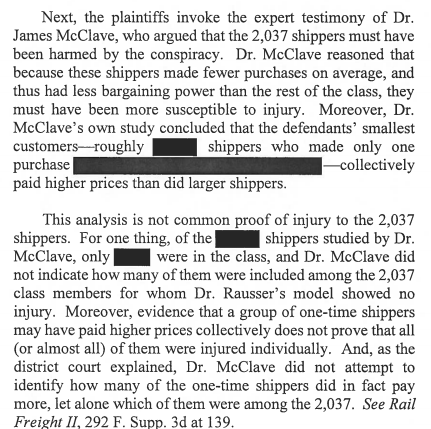D.C. Circuit Review – Reviewed: More Evidence of a Collegial-ish Court
The D.C. Circuit is a collegial-ish court. The judges try to play nice, even when deciding hard cases.* And most of them they pull it off.
Consider Alon Refining Krotz Springs, Inc. v. EPA. This is a long, complicated opinion penned by a per curiam panel of Judges Pillard and Katsas. It even has a table of contents. If you follow Clean Air Act litigation, you should read the whole opinion; ditto if you are involved in a case addressing time limits to seek judicial review. For purposes of this post, however, I want to focus on Judge Williams. He concurred in the judgment, and this is the heart of his analysis:
And here is a jab at his colleagues:
And then this:
In relevant part (this is a very long opinion), the majority responded as follows:
This is a fairly collegial disagreement, the full details of which require a deep dive into a complex statute (and the possibility that your eyes will “glaze over”). Candidly, I’m not sure who has the better of the argument. But this exchange is noteworthy.
In re Sealed Case contains a jab too. This case — authored by Judge Griffith, joined by Judge Sentelle, and about “how the Foreign Commerce and Due Process Clauses of the Constitution limit the extraterritorial application of [a criminal] statute” — prompted the following paragraph from Judge Henderson:
What’s in Section II.B.2, you wonder? Read it! If you’d rather spend your weekend at the beach you don’t have time, it contains a discussion of whether the “substantial effects” test from United States v. Lopez applies, or whether Congress can “regulat[e ] foreign commerce with less an effect on the United States.” The D.C. Circuit doesn’t say which test it agrees with, but it pooh-poohs this argument: “Appellant’s argument goes further, asking us to hold that Congress can only make criminal a foreign commercial activity that takes place in the course of commerce with the United States. Such a narrow construction would bar Congress from outlawing drug trafficking that lends financial support to terrorist organizations in foreign countries when that support merely ‘affects’ commerce with the United States.” Griffith explains: “Given the Supreme Court’s longstanding approach to the Interstate Commerce Clause and the approach of our sister circuits to the Foreign Commerce Clause, the need for the strict construction Appellant urges is by no means self-evident. And once we conclude that some version of an ‘effects test’ applies, Appellant’s remaining arguments are simply attempts to recharacterize the facts to which he stipulated, minimizing his role in the conspiracy and its magnitude to suggest that the effect of his behavior on commerce with the United States was too small for Congress to reach.”
Judge Henderson’s opinion, surprisingly, calls out Judge Griffith by name — “Griffith, J.” That counts as a jab in my book, albeit a pretty collegial-ish one.
Finally, the last case of the week is one we have seen before: In re Rail Freight Fuel Surcharge Antitrust Litigation. As I noted a couple of weeks ago, the Court’s opinion held back information:
That information is now available. It was “roughly 10,000 shippers who made only one purchase either before or during the class period,” and “of the 10,000 shippers studied,” “only 3,700 were in the class.”
Why was this information left out last time? Presumably because the panel wasn’t sure whether it was confidential. The docket shows that the panel, on its own motion, ordered the parties to show cause why they sealed portion should not be unsealed. The parties filed a joint response stating they did not object.
True, this last case doesn’t have much to do with collegiality. But when it comes to identifying a theme for a blog post, I can live with two out of three.
* At least this week, it appears that not all courts are collegial when it comes to administrative law!
D.C. Circuit Review – Reviewed is designed to help you keep track of the nation’s “second most important court” in just five minutes a week.









